| Listing 1 - 10 of 21 | << page >> |
Sort by
|
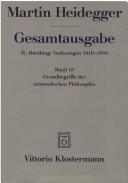
ISBN: 3465031628 3465031601 9783465031604 9783465031628 Year: 2002 Volume: 18 18 Publisher: Frankfurt am Main: Klostermann,
Abstract | Keywords | Export | Availability | Bookmark
 Loading...
Loading...Choose an application
- Reference Manager
- EndNote
- RefWorks (Direct export to RefWorks)
Aristotle --- Rhetoric --- Rhétorique --- Philosophy. --- Philosophie --- Aristotle. --- Heidegger, Martin, --- Philosophy --- Rhétorique --- Mental philosophy --- Humanities --- Aristoteles --- Aristote --- Aristotile --- Aristoteles. --- Arisṭāṭṭil --- Aristo, --- Aristotel --- Aristotele --- Aristóteles, --- Aristòtil --- Arisṭū --- Arisṭūṭālīs --- Arisutoteresu --- Arystoteles --- Ya-li-shih-to-te --- Ya-li-ssu-to-te --- Yalishiduode --- Yalisiduode --- Ἀριστοτέλης --- Αριστοτέλης --- Аристотел --- ארסטו --- אריםטו --- אריסטו --- אריסטוטלס --- אריסטוטלוס --- אריסטוטליס --- أرسطاطاليس --- أرسططاليس --- أرسطو --- أرسطوطالس --- أرسطوطاليس --- ابن رشد --- اريسطو --- Pseudo Aristotele --- Pseudo-Aristotle --- アリストテレス
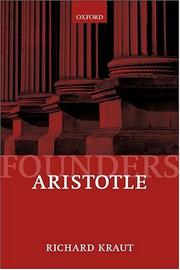
ISBN: 0198782004 9780198782001 Year: 2002 Publisher: Oxford : Oxford university press,
Abstract | Keywords | Export | Availability | Bookmark
 Loading...
Loading...Choose an application
- Reference Manager
- EndNote
- RefWorks (Direct export to RefWorks)
Aristotle --- Contributions in political science. --- Political and social views --- Aristoteles --- Aristote --- Aristotile --- Political and social views. --- Arisṭāṭṭil --- Aristo, --- Aristotel --- Aristotele --- Aristóteles, --- Aristòtil --- Arisṭū --- Arisṭūṭālīs --- Arisutoteresu --- Arystoteles --- Ya-li-shih-to-te --- Ya-li-ssu-to-te --- Yalishiduode --- Yalisiduode --- Ἀριστοτέλης --- Αριστοτέλης --- Аристотел --- ארסטו --- אריםטו --- אריסטו --- אריסטוטלס --- אריסטוטלוס --- אריסטוטליס --- أرسطاطاليس --- أرسططاليس --- أرسطو --- أرسطوطالس --- أرسطوطاليس --- ابن رشد --- اريسطو --- Pseudo Aristotele --- Pseudo-Aristotle --- アリストテレス --- Aristotle - Political and social views

ISBN: 0268020132 0268020140 9780268020149 9780268020132 Year: 2002 Publisher: Notre Dame (Ind.): University of Notre Dame press,
Abstract | Keywords | Export | Availability | Bookmark
 Loading...
Loading...Choose an application
- Reference Manager
- EndNote
- RefWorks (Direct export to RefWorks)
Political science --- Philosophy. --- Aristotle --- Contributions in political science. --- Political philosophy --- Philosophy --- Aristoteles. --- Aristoteles --- Aristote --- Aristotile --- Arisṭāṭṭil --- Aristo, --- Aristotel --- Aristotele --- Aristóteles, --- Aristòtil --- Arisṭū --- Arisṭūṭālīs --- Arisutoteresu --- Arystoteles --- Ya-li-shih-to-te --- Ya-li-ssu-to-te --- Yalishiduode --- Yalisiduode --- Ἀριστοτέλης --- Αριστοτέλης --- Аристотел --- ארסטו --- אריםטו --- אריסטו --- אריסטוטלס --- אריסטוטלוס --- אריסטוטליס --- أرسطاطاليس --- أرسططاليس --- أرسطو --- أرسطوطالس --- أرسطوطاليس --- ابن رشد --- اريسطو --- Pseudo Aristotele --- Pseudo-Aristotle --- アリストテレス --- Political science - Philosophy. --- Aristotle - Contributions in political science.
Book
ISBN: 3896651749 Year: 2002 Publisher: Sankt Augustin : Academia Verlag,
Abstract | Keywords | Export | Availability | Bookmark
 Loading...
Loading...Choose an application
- Reference Manager
- EndNote
- RefWorks (Direct export to RefWorks)
Aristotle. --- Aristotle --- Aristoteles --- Aristote --- Aristotile --- Criticism and interpretation --- History --- Influence --- Arisṭāṭṭil --- Aristo, --- Aristotel --- Aristotele --- Aristóteles, --- Aristòtil --- Arisṭū --- Arisṭūṭālīs --- Arisutoteresu --- Arystoteles --- Ya-li-shih-to-te --- Ya-li-ssu-to-te --- Yalishiduode --- Yalisiduode --- Ἀριστοτέλης --- Αριστοτέλης --- Аристотел --- ארסטו --- אריםטו --- אריסטו --- אריסטוטלס --- אריסטוטלוס --- אריסטוטליס --- أرسطاطاليس --- أرسططاليس --- أرسطو --- أرسطوطالس --- أرسطوطاليس --- ابن رشد --- اريسطو --- Pseudo Aristotele --- Pseudo-Aristotle --- アリストテレス
Book
ISBN: 9519264450 Year: 2002 Publisher: Helsinki : Societas philosophica Fennica,
Abstract | Keywords | Export | Availability | Bookmark
 Loading...
Loading...Choose an application
- Reference Manager
- EndNote
- RefWorks (Direct export to RefWorks)
Ethics, Ancient. --- Ethics, Ancient --- Ancient ethics --- Aristotle. --- Aristoteles --- Aristote --- Aristotle --- Aristotile --- Aristoteles. --- Arisṭāṭṭil --- Aristo, --- Aristotel --- Aristotele --- Aristóteles, --- Aristòtil --- Arisṭū --- Arisṭūṭālīs --- Arisutoteresu --- Arystoteles --- Ya-li-shih-to-te --- Ya-li-ssu-to-te --- Yalishiduode --- Yalisiduode --- Ἀριστοτέλης --- Αριστοτέλης --- Аристотел --- ארסטו --- אריםטו --- אריסטו --- אריסטוטלס --- אריסטוטלוס --- אריסטוטליס --- أرسطاطاليس --- أرسططاليس --- أرسطو --- أرسطوطالس --- أرسطوطاليس --- ابن رشد --- اريسطو --- Pseudo Aristotele --- Pseudo-Aristotle --- アリストテレス
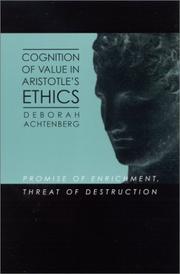
ISBN: 0791453715 0791453723 9780791453711 9780791453728 Year: 2002 Publisher: New York: State university of New York press,
Abstract | Keywords | Export | Availability | Bookmark
 Loading...
Loading...Choose an application
- Reference Manager
- EndNote
- RefWorks (Direct export to RefWorks)
Aristotle --- Ethics --- Ethics. --- Aristoteles --- Aristote --- Aristotile --- Arisṭāṭṭil --- Aristo, --- Aristotel --- Aristotele --- Aristóteles, --- Aristòtil --- Arisṭū --- Arisṭūṭālīs --- Arisutoteresu --- Arystoteles --- Ya-li-shih-to-te --- Ya-li-ssu-to-te --- Yalishiduode --- Yalisiduode --- Ἀριστοτέλης --- Αριστοτέλης --- Аристотел --- ארסטו --- אריםטו --- אריסטו --- אריסטוטלס --- אריסטוטלוס --- אריסטוטליס --- أرسطاطاليس --- أرسططاليس --- أرسطو --- أرسطوطالس --- أرسطوطاليس --- ابن رشد --- اريسطو --- Pseudo Aristotele --- Pseudo-Aristotle --- アリストテレス

ISBN: 0791488632 0585471207 9780585471204 0791453715 9780791453711 0791453723 9780791453728 9780791488638 Year: 2002 Publisher: Albany State University of New York Press
Abstract | Keywords | Export | Availability | Bookmark
 Loading...
Loading...Choose an application
- Reference Manager
- EndNote
- RefWorks (Direct export to RefWorks)
With this new interpretation, Deborah Achtenberg argues that metaphysics is central to ethics for Aristotle and that the ethics can be read on two levels—imprecisely, in terms of its own dialectically grounded and imprecise claims, or in terms of the metaphysical terms and concepts that give the ethics greater articulation and depth. She argues that concepts of value—the good and the beautiful—are central to ethics for Aristotle and that they can be understood in terms of telos where 'telos' can be construed to mean 'enriching limitation' and contrasted with harmful or destructive limitation. Achtenberg argues that the imprecision of ethics for Aristotle results not simply from the fact that ethics has to do with particulars, but more centrally from the fact that it has to do with the value of particulars. She presents new interpretations of a wide variety of passages in Aristotle's metaphysical, physical, psychological, rhetorical, political, and ethical works in support of her argument and compares Aristotle's views to those of Plato, Marcus Aurelius, the Hebrew Bible, Hobbes, Rousseau, Kant, Freud, and twentieth-century object relations theorists. Achtenberg also responds to interpretations of Aristotle's ethics by McDowell, Nussbaum, Sherman, Salkever, Williams, Annas, Irwin, Roche, Gomez-Lobo, Burnyeat, and Anagnostopoulos.
Aristotle --- Aristoteles --- Aristote --- Arisṭāṭṭil --- Aristo, --- Aristotel --- Aristotele --- Aristóteles, --- Aristòtil --- Aristotile --- Arisṭū --- Arisṭūṭālīs --- Arisutoteresu --- Arystoteles --- Ya-li-shih-to-te --- Ya-li-ssu-to-te --- Yalishiduode --- Yalisiduode --- Ἀριστοτέλης --- Αριστοτέλης --- Аристотел --- ארסטו --- אריםטו --- אריסטו --- אריסטוטלס --- אריסטוטלוס --- אריסטוטליס --- أرسطاطاليس --- أرسططاليس --- أرسطو --- أرسطوطالس --- أرسطوطاليس --- ابن رشد --- اريسطو --- Pseudo Aristotele --- Pseudo-Aristotle --- アリストテレス --- Ethics. --- Ethics, Ancient. --- Ancient ethics --- Aristotle - Ethics
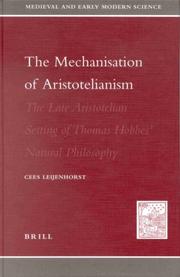
ISBN: 9004117296 9004475044 Year: 2002 Publisher: Leiden Brill
Abstract | Keywords | Export | Availability | Bookmark
 Loading...
Loading...Choose an application
- Reference Manager
- EndNote
- RefWorks (Direct export to RefWorks)
Hobbes, Thomas --- Hobbes, Thomas, --- Aristote, --- Aristotle --- Influence --- Influence. --- -Hobbes, Thomas --- Arisṭāṭṭil --- Aristo, --- Aristote --- Aristotel --- Aristotele --- Aristoteles --- Aristóteles, --- Aristòtil --- Aristotile --- Arisṭū --- Arisṭūṭālīs --- Arisutoteresu --- Arystoteles --- Ya-li-shih-to-te --- Ya-li-ssu-to-te --- Yalishiduode --- Yalisiduode --- Ἀριστοτέλης --- Аристотел --- ארסטו --- אריםטו --- אריסטו --- אריסטוטלס --- אריסטוטלוס --- אריסטוטליס --- أرسطاطاليس --- أرسططاليس --- أرسطو --- أرسطوطالس --- أرسطوطاليس --- ابن رشد --- اريسطو --- Αριστοτέλης --- Pseudo Aristotele --- Pseudo-Aristotle --- アリストテレス --- Gobbs, Tomas, --- Hobbs, Thomas, --- Gobbes, Tomas, --- T. H. --- H., T. --- Hobs, Thomas, --- Hobbes, --- Hobbes, Thom. --- Hobbius, Thomas, --- Hobbuzu, Tomasu, --- Huobusi, --- Hobbs, Tho. --- הובס, תומס, --- 霍布斯, --- ホッブズ, トマス,
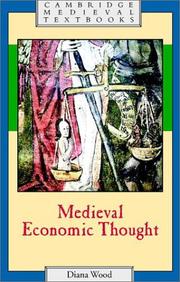
ISBN: 0521458935 0521452600 0511116101 0511039441 0511148348 0511330294 0511811047 1280151803 0511052812 1107126584 9780511039447 9780521458931 9780521452601 9780511811043 Year: 2002 Volume: *4 Publisher: Cambridge: Cambridge University Press,
Abstract | Keywords | Export | Availability | Bookmark
 Loading...
Loading...Choose an application
- Reference Manager
- EndNote
- RefWorks (Direct export to RefWorks)
This book is an introduction to medieval economic thought, mainly from the twelfth to the fifteenth centuries, as it emerges from the works of academic theologians and lawyers and other sources - from Italian merchants' writings to vernacular poetry, Parliamentary legislation, and manorial court rolls. It raises a number of questions based on the Aristotelian idea of the mean, the balance and harmony underlying justice, as applied by medieval thinkers to the changing economy. How could private ownership of property be reconciled with God's gift of the earth to all in common? How could charity balance resources between rich and poor? What was money? What were the just price and the just wage? How was a balance to be achieved between lender and borrower and how did the idea of usury change to reflect this? The answers emerge from a wide variety of ecclesiastical and secular sources.
Economic schools --- Economics --- Economie politique --- History --- Histoire --- Aristotle. --- Aristotle --- Economics. --- Economic Theory --- Business & Economics --- 330.81 --- Voorlopers van Adam Smith. Mercantilisme. Colbertisme. Fysiocraten. Kameralisme --(economisch denken) --- Arts and Humanities --- 330.81 Voorlopers van Adam Smith. Mercantilisme. Colbertisme. Fysiocraten. Kameralisme --(economisch denken) --- Aristoteles --- Aristote --- Aristotile --- Contributions in economics. --- Arisṭāṭṭil --- Aristo, --- Aristotel --- Aristotele --- Aristóteles, --- Aristòtil --- Arisṭū --- Arisṭūṭālīs --- Arisutoteresu --- Arystoteles --- Ya-li-shih-to-te --- Ya-li-ssu-to-te --- Yalishiduode --- Yalisiduode --- Ἀριστοτέλης --- Αριστοτέλης --- Аристотел --- ארסטו --- אריםטו --- אריסטו --- אריסטוטלס --- אריסטוטלוס --- אריסטוטליס --- أرسطاطاليس --- أرسططاليس --- أرسطو --- أرسطوطالس --- أرسطوطاليس --- ابن رشد --- اريسطو --- Pseudo Aristotele --- Pseudo-Aristotle --- アリストテレス --- Economics - History - To 1800. --- Influence
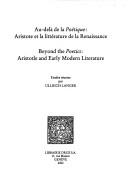
ISBN: 2600006982 9782600006989 Year: 2002 Volume: 367 Publisher: Genève: Droz,
Abstract | Keywords | Export | Availability | Bookmark
 Loading...
Loading...Choose an application
- Reference Manager
- EndNote
- RefWorks (Direct export to RefWorks)
European literature --- History and criticism. --- Aristotle --- Influence --- -European literature --- History and criticism --- -Arisṭāṭṭil --- Aristo, --- Aristote --- Aristotel --- Aristotele --- Aristoteles --- Aristóteles, --- Aristòtil --- Aristotile --- Arisṭū --- Arisṭūṭālīs --- Arisutoteresu --- Arystoteles --- Ya-li-shih-to-te --- Ya-li-ssu-to-te --- Yalishiduode --- Yalisiduode --- Ἀριστοτέλης --- Аристотел --- ארסטו --- אריםטו --- אריסטו --- אריסטוטלס --- אריסטוטלוס --- אריסטוטליס --- أرسطاطاليس --- أرسططاليس --- أرسطو --- أرسطوطالس --- أرسطوطاليس --- ابن رشد --- اريسطو --- -History and criticism --- -Influence --- -Aristoteles --- Influence. --- Literature --- anno 1400-1499 --- anno 1500-1599 --- 1450-1600 (Renaissance) --- Arisṭāṭṭil --- Αριστοτέλης --- Pseudo Aristotele --- Pseudo-Aristotle --- アリストテレス --- European literature - Renaissance, 1450-1600 - History and criticism. --- Aristotle - Influence
| Listing 1 - 10 of 21 | << page >> |
Sort by
|

 Search
Search Feedback
Feedback About UniCat
About UniCat  Help
Help News
News